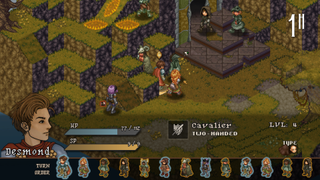Jazzy storybook tactics RPG Arcadian Atlas welds Hamlet to Final Fantasy Tactics
Making a strategy RPG in 2023 be madness, yet there is method in't.

A kingdom torn asunder by rival claimants to the throne with lovers caught in the crossfire—it's a tale as old as, well, any number of strategy RPGs that are flooding the Steam store pages these days. Arcadian Atlas doesn't differentiate itself from its contemporaries at a glance, but some raw writing and rapid-fire turn based combat help it stand out.
Arcadian Atlas gives you control of characters one at a time instead of the traditional "give commands to your entire team" turn-based structure, which is a huge win for an impatient, overzealous commander such as myself. There's a turn queue on the UI that plainly lays out who goes next, and having multiple units stacked up in a row can end up being as much an opportunity as it is a threat. I really dug how fast combat felt, where a ranger stepping into my cavalier's threat range could be immediately cut down after shrugging off his piddly arrows. Arcadian Atlas' quick pace comes to a crawl when trying to skirmish around hills or cliff sides, however, which are a pain to navigate around with the mouse controls due to the isometric perspective.
I was also confused by the ability to determine the facing of a character once you've finished moving them, something which as far as I can tell partway through the game has no bearing on attack or defense. It honestly feels like a missed opportunity, not having a backstab system to compliment the orientation move.
Once I figured out my units could get their spines cleaved in without taking critical damage, I started playing way more aggressively. I had a lot of luck in using attacks that would affect two or three targets at the same time, forcing the AI's apothecary to pick one friendly to heal and then immediately murdering whichever one it ignored. It's a fun loop, and job specializations let you push that damage further between missions. Party composition has a freedom that I really dug, too—for the first four missions, I totally neglected ranged units and stacked my party with potion-slinging apothecaries to keep my cavaliers in the field, launching devastating decapitation attacks at enemy commanders before mopping up the small fry with grenades.
One cool quality of life feature is the lack of individual XP, so the whole party levels up together, leaving no one behind. I cannot emphasize enough how much my OCD appreciates not having to stress over neglecting a class I dislike, perpetually leaving them underleveled.
The presentation, with some inevitable echoes of Final Fantasy Tactics, I wasn't totally sold on. It's clearly invoking elements of the Art Nouveau movement with its warm palette, filigree-laden menus, and blushing portraiture, but the aesthetic didn't quite land for me. Arcadian Atlas's character portraits, which you'll spend a lot of time staring at over the course of its 70+ missions, rarely succeed at mimicking the lithographs they're aiming for with garish costuming and awkward airbrush highlights. The pixel art is generally great, but there's occasionally a purple haired elf in bikini armor that diminishes that Parisian storybook feel.







The soundtrack, though, is an absolute home run, a melancholy arrangement of jazz and downtempo orchestral pieces with an earworm of a saxophone. It's an inspired choice that immediately sets Arcadian Atlas's score apart from the blaring MIDI horn samples I'm used to in so many other 2D pixel art games.
The biggest gaming news, reviews and hardware deals
Keep up to date with the most important stories and the best deals, as picked by the PC Gamer team.
I was also drawn in by the writing. Arcadian Atlas opens with a promise that "This is the story of Arcadia's burning," a hard as hell line backed up by a tutorial that sees you drawing a Royalist army into a forest before trapping them and setting it ablaze. See, Arcadia's in the midst of an inheritance dispute between an unpopular queen accused of poisoning her husband to steal the throne and her obsessive, power-craven step-daughter, and you follow two lovers caught on opposing sides. The narrative here is clearly Hamlet-inspired, rife with compelling melodrama and sharp dialogue that had me second-guessing the machinations of Arcadian Atlas's power hungry cast early on.
It's good stuff, and I think anyone with an appetite for this type of narrative will find themselves drawn in.
It nails the tone of an older SRPG, too—even comic relief characters like Poncho, a kickass raccoon with a crossbow, aren't introduced with schlocky, online-pilled "get a load of this" style writing. It all imbues Arcadian Atlas with a sense of authenticity that I really came away enjoying.
There are too many strategy RPGs out there vying for your time and attention, no small ask given the often massive scope of games within this genre. Arcadian Atlas doesn't bring anything revolutionary to bear, but the combat, the story, and especially the music all reach a high bar that make it worth paying attention to.

Nova Smith is a freelance writer based out of Alberta, Canada. Nova's grab bag of non-gaming interests and passions includes Japanese mecha anime, miniature painting, as well as history, literature, and classical music. Nova also moonlights as a bureaucrat and amateur historian.
Most Popular


